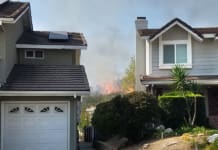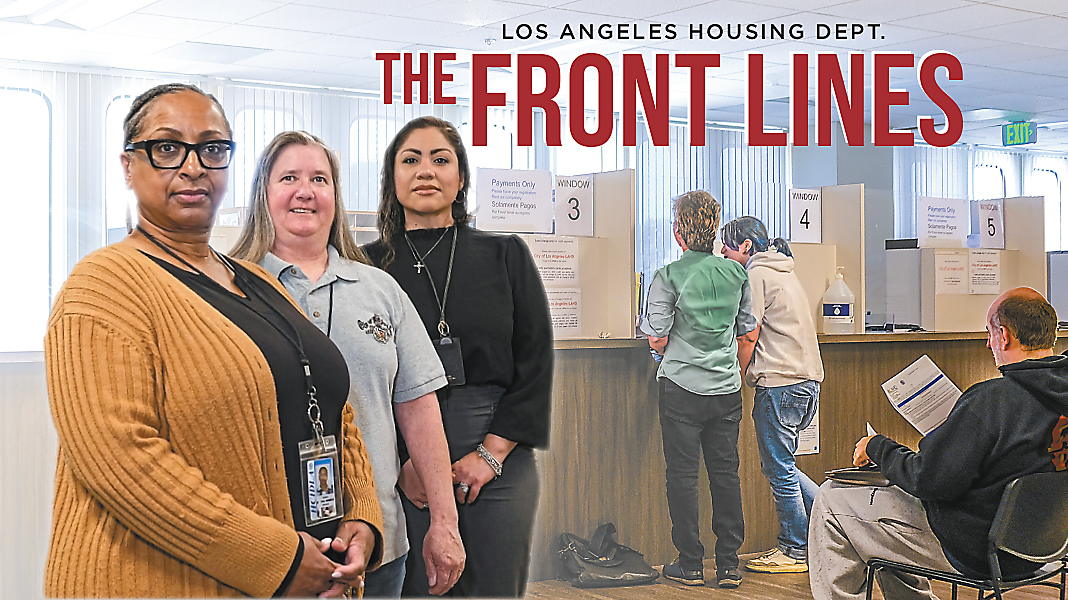
E
verywhere in the City of Los Angeles, housing is tight. And expensive. And for those on the margins, an emotional roller coaster of insecurity.
Los Angeles Housing Dept. faces the challenge every working day of taking care of citizens in need, all according to housing code.
On the front lines of the crunch is the department’s inspection services. At their public counters and through their hotlines and internet portals, the inspectors receive the complaints and execute regularly scheduled inspections, and are usually the first to be confronted with tough situations.
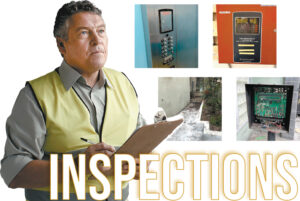 The Code Enforcement and Rent Divisions face citizen struggles to stay in housing, to make sure landlords are keeping up their properties and not evicting renters illegally. At the same time, the divisions also serve landlords, protecting them from renters who are taking advantage of situations against code. Simply, the LAHD divisions are in it to find and execute ethical resolutions to housing issues.
The Code Enforcement and Rent Divisions face citizen struggles to stay in housing, to make sure landlords are keeping up their properties and not evicting renters illegally. At the same time, the divisions also serve landlords, protecting them from renters who are taking advantage of situations against code. Simply, the LAHD divisions are in it to find and execute ethical resolutions to housing issues.
This month, we spend time with three inspection managers – Karen Baggio, Principal Inspector, Club Member; Xanat Rosas, Sr. Housing Investigator and Customer Information Manager, Club Member; and Kristine Ritzke, Sr. Housing Investigator; to get a look into the challenges that LAHD faces and better understand what’s happening on the front lines. We deeply honor them for their service and dedication to the City.
We thank Karen, Xanat and Kristine for their time and honesty, and we thank LAHD’s Sharon Sandow, Dana Webster, Sophia Steiner and Pedro Barrera for their assistance. •
The First Place
On March 7, Alive! editor John Burnes interviewed Xanat Rosas, Sr. Housing Investigator and Manager of the Rent Division’s Public Counters, Hotline and Information Section, 18 years of City service, Club Member. The interview took place via Zoom. • Her first name is pronounced Sha-NAT.
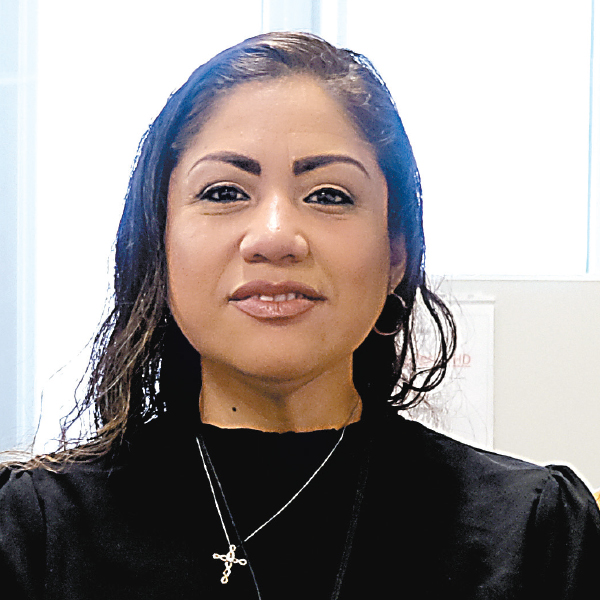
Thanks for talking to Alive! readers today. Tell us a little about your position.
Xanat Rosas: Sure. I am responsible for managing LAHD’s Rent Division’s public counters and hotline. We are the department’s first point of contact. All inquiries regarding housing issues are directed to us in person, over the phone, or virtually. The information we provide pertains to all aspects of housing. We are committed to providing excellent customer service.
How many counters are there?
Xanat: We currently have four public counters. We also have a virtual counter. [See the sideboar “How to Contact LAHD”]
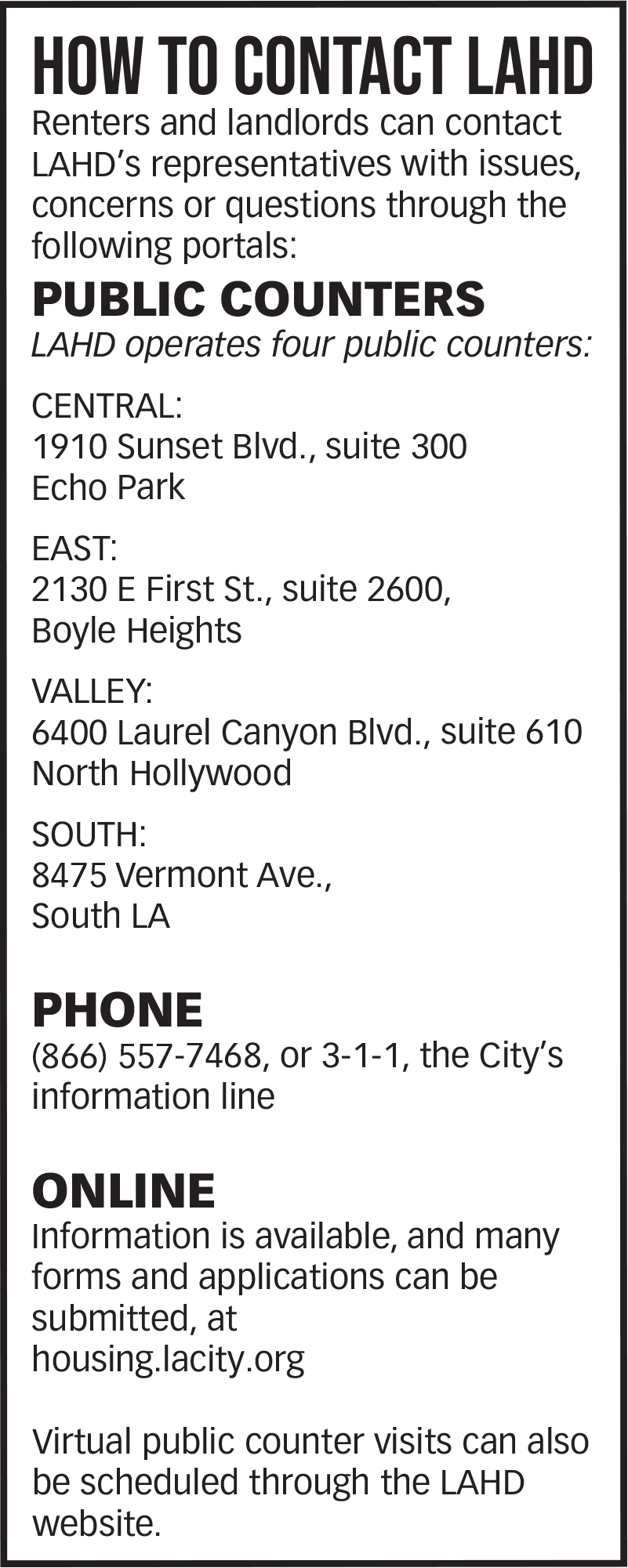
Xanat, tell us about your career, and how you got to where you are.
Xanat: My employment with LAHD began in October 2005 as a contractor at-will paralegal investigating complaints regarding alleged violations of the Rent Stabilization Ordinance (RSO).
I officially began my career with the City of Los Angeles in May 2007 when an opening for a Housing Investigator position became available.
As time progressed, I was promoted to Lead Housing Investigator, which involves supervising a group of Investigators as well as handling more challenging cases. I was promoted to Sr. Housing Investigator in December 2018 in the Customer Service and Information section. I am proud of the progress I have made in my career and excited to continue developing in this role. I am determined to continue working hard and furthering my career.
Before you started as a contractor in 2005, was there anything that led up to this career?
Xanat: Yes. While attending paralegal school, I worked in a law firm as a paralegal since 1999. As part of our firm’s practice areas, we handled unlawful detainers, which gave me a good understanding of the unlawful detainer/eviction process, as well as a better understanding of the housing issues that landlords and tenants face and, of course, allowed me to become a regular LAHD customer for the firm’s clients.
An interesting and humorous event occurred then. I was informed by my supervisor at the time that the office would be closing and that I would need to begin searching for alternative employment. My search for employment began right away, and as part of the process I uploaded my resume to Monster.com. However, the firm did not close, and I continued to work there. Years later, I was contacted by a work agency that invited me to apply for the Paralegal position with LAHD. My resume posted online provided the agency with my contact information. It was through this experience that I was able to secure a position as a Paralegal for LAHD several years later.
 The Public Counters
The Public Counters
Explain how public counters work.
Xanat: LAHD provides a variety of services at its public counters. We provide education and guidance to landlords, tenants, community advocates, attorneys and constituents in general on the LAMC regarding the RSO, the Just Cause Evictions Ordinance and all housing-related laws. We intake complaints about alleged violations of the LAMC related to housing matters. These include possible illegal evictions, illegal rent increases, failure to pay relocation assistance, or habitability cases that require repair. We provide resources and referrals. We also process transactions and accept payments for annual registration fees, Systematic Code Enforcement Program (SCEP) fees, inspection fees, and other fees. A couple of important fees are collected once a year, which are due by the end of February. Landlords are required to pay the registration fee to be able to collect or demand rent from properties subject to the RSO. The second fee is the Systematic Code Enforcement fee. This is associated with the Systematic Code Enforcement inspections conducted by our Code Enforcement staff every three to five years. We also address billing concerns such as appeals of fees, exemption requests, etcetera and notify relevant staff of any discrepancies. We assist constituents with completion of the rent registry forms and other LAHD forms. We receive and process records requests. We also receive and upload documents for Housing Investigators, LAHD Inspectors, or other LAHD sections.
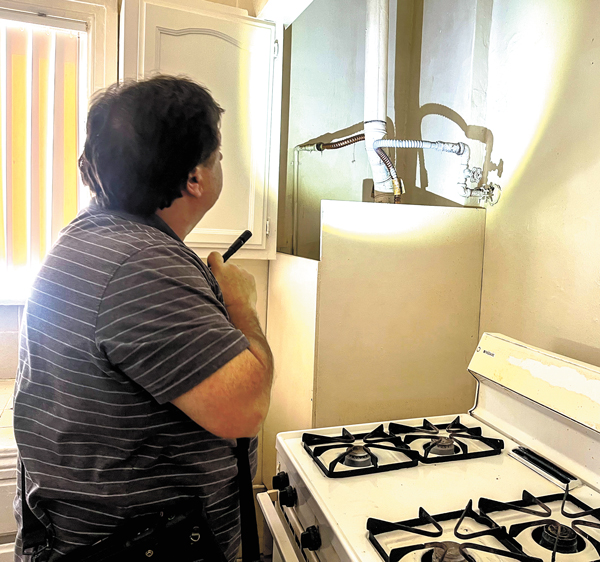 Right. We talked to Karen and Kristine about the systematic inspections.
Right. We talked to Karen and Kristine about the systematic inspections.
Xanat: In addition to these services, there are many others which are requested of us but are not provided by us such as information regarding Section 8, legal and civil matters. As a result, we provide alternative resources or refer people to other agencies when services are not available at the LAHD We provide as much information as possible to ensure that people are able to access the resources they need. We also offer advice on finding housing options and resources. We are always happy to answer any questions and provide assistance to the best of our ability.
Constituents can meet with us in a variety of ways. We would be glad to assist constituents personally at one of our public counters, virtually through a virtual appointment, by phone at (866) 557-7468, or online through housing.lacity.org. We also provide online tools for constituents to ask questions about housing services, submit applications, and request assistance. Constituents can contact us directly for assistance or visit our website for more information. Alternatively, they can call 3-1-1, the City’s information line.
So, basically, the job ticket begins with the public counters.
Xanat: Yes, it begins with us. There is a great deal of responsibility involved. People typically want to tell their whole story at the public counters before they are able to get to the issue at hand. The counter staff are very well trained and patient, and I am extremely impressed with their abilities. We need to hear these stories; our constituents need to understand how important it is to us as well, while keeping the discussion focused on the issue at hand. It is imperative that we have a full understanding of every allegation the tenant has, or the Housing Investigator or the Housing Investigator will not be able to enforce the alleged violation(s). For example, when filing a CODE enforcement complaint regarding housing conditions in need of repair, the tenant must include a detailed listing of each alleged violation, otherwise the Housing Investigator will not be able to cite a violation even if it is observed on site (unless it is an urgent or emergency situation). This is where the counter staff plays a crucial role, since we must ensure that all participants are informed of the procedures and that each alleged violation is noted on the complaint form.
To get it all down at the very beginning.
Xanat: Yes, exactly. It is not only important for the Housing Investigator, but also for the complainant to ensure that any issues are addressed and that the customer is satisfied with the service provided.
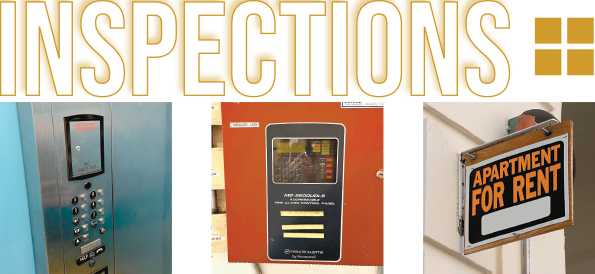
 Emotional Moments
Emotional Moments
LAHD can be one of the most emotional aspects of our lives. It’s where people live, raise families, and so much more. You must encounter and manage some very emotional moments at the counters, on the virtual visits, and so forth.
Xanat: Every day, we hear stories ranging from instances of tenants receiving notices of rent increases that they are unable to afford, to instances of constituents facing homelessness as a result of eviction because they cannot afford the rent. In addition to that, there are also stories where people claim that the roof is collapsing as a result of the heavy rain. There could also be a landlord who constantly harasses a tenant in various ways to force the tenant out, or a landlord who is losing their property through foreclosure because they are not receiving any rent. These stories illustrate the difficult situations facing landlords and tenants in the present day. In light of this, LAHD always strives to ensure that residents have access to affordable and safe rental housing as well as that landlords receive a reimbursement for their investment. LAHD works to bridge the gap between landlords and tenants by providing resources and assistance to those in need.
With the pandemic over, evictions returning and housing in LA in crisis mode in a lot of areas, it must be a really difficult time. Are you feeling the tension at your counters?
Xanat: Certainly, tensions are high on the front lines. Between the years 2022 and 2023, customer traffic at the public counters increased by 76 percent as a result of the increased number of rental properties requiring LAHD’s enforcement and different new municipal laws providing new or updated renter protections. According to the number of counter appointments handled during January and February 2024, it is projected that by the end of 2024, it will reach approximately a 56 percent increase over 2023. In addition to the influx of customers at the counters, the volume of telephone calls is another significant indicator. In January 2024 alone, we received more than 40,000 calls at our call center compared to the monthly average of about 19,000 in the past. This surge in counter traffic and calls has put an extra strain on our customer service team.
Wow.
Xanat: However, we are trying our best to accommodate everyone who needs help. We are working hard to provide additional resources and support to our customer service team. We are committed to providing the best customer service during this difficult time.
I’m sure your office tried to ramp up knowing that this influx was coming. But 40,000 calls in a month, that’s unbelievable.
Xanat: We’ve had to adjust our operations to accommodate the influx of customers seeking help. We have also implemented new strategies to streamline the call process and provide faster response times. We’ve had to hire more staff, extend our hours, work overtime, and come up with creative solutions to help those most in need. It’s been a difficult but rewarding experience for us.
 LAHD’s Front Lines
LAHD’s Front Lines
Can you share a few stories that were either happily resolved, or that were difficult?
Xanat: Yes. One story that comes to mind is about a family living in a rent-controlled apartment. During and following the pandemic, the family encountered financial hardship as a result of COVID-related reasons and had difficulty paying rent. The family was concerned about being evicted and therefore homeless, and due to the high costs in Los Angeles, it was extremely difficult to find a rent-controlled unit that would be affordable. We assisted them in finding resources and solutions that enabled them to remain in their home. We offered them referrals to legal advice. The ULA Renter’s Assistance Program allowed us to assist the family in catching up on their rent arrears and providing them with the financial assistance they needed to remain in their home. Additionally, we were able to provide them with resources to assist them in managing their finances in the future. In the end, this family kept their home and remained safe and secure. It was a rewarding experience for us and the family. Many families experience situations similar to those experienced by this family. We are committed to providing assistance and resources to those in need. We strive to make a positive impact in the lives of those around us.
In contrast, landlords also face similar challenges, including rent payments not being made, resulting in a high risk of foreclosure. Landlords need to manage these risks by implementing eviction and rent collection policies. We are responsible for providing resources and information about their rights and responsibilities. In addition, we keep them informed of any new legislation or regulations that may affect their businesses. We strive to create an environment where landlords are treated fairly and respectfully.
Landlords are free to call you, too.
Xanat: Of course.
Your job is to protect life and livability, but also to follow the law or the code.
Xanat: Exactly.
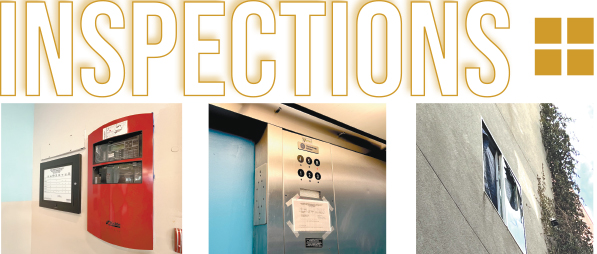
 Be Prepared
Be Prepared
What do you wish people knew about the whole process?
Xanat: To be prepared with all your information, complaints, and concerns from the onset of your interaction with LAHD. Do not be afraid to voice your concerns and provide all the information you can obtain. LAHD staff want to understand your situation and provide you with the support you need. Be prepared to answer questions and be open and honest with staff. This will help them provide the best service possible. Neither LAHD nor its staff will ask for your immigration status. We will respect your privacy and protect your information. LAHD staff will not ask you to provide any information that you are not comfortable sharing.
 Wanting to Help
Wanting to Help
What do you love about what you do?
Xanat: As a public servant, my responsibilities go beyond fulfilling my basic duties; they include the ability to make sound decisions, manage resources efficiently, and maintain high ethical and transparency standards. I must also strive to represent my community’s best interests, and keep the public informed. Information is knowledge, and knowledge is power. Therefore, I must ensure that I provide the public with accurate and up-to-date information.
A significant part of what I enjoy and love about my job is the satisfaction and impact it has on the community. I’m proud to know that my work makes a difference in people’s lives. I’m also grateful for the opportunity to work in an industry that is so rewarding. By doing this, I am able to make a positive impact on society and contribute to my community’s development.
That’s an amazing power that the City has invested in you.
Xanat: I must use this power responsibly and honestly. I must also keep the public informed of any changes and developments that affect them. My actions must always be in the right interests of those I serve, and I must be held accountable for them. It is important for me to act with integrity and fairness at all times.
Xanat, thank you for taking the time to tell us about how your area of LAHD works, and for serving everyone in Los Angeles at a difficult time.
Xanat: Thank you so much.
Livability and Advocacy
On March 5, Association CEO Robert Larios and Alive! editor John Burnes interviewed Karen Baggio, Principal Inspector, Manager of the Central Regional Office, Code Enforcement, 26 years of City service, Club Member; and Kristine Ritzke, Sr. Housing Inspector, Supervisor of the South Regional Office for Complaints, 16 years of City service.
Karen and Kristine, thanks for joining us today to talk about a big part of LAHD’s response to the City’s housing crisis – the very important inspection function. But first, tell us your career path – how you got to your current position.
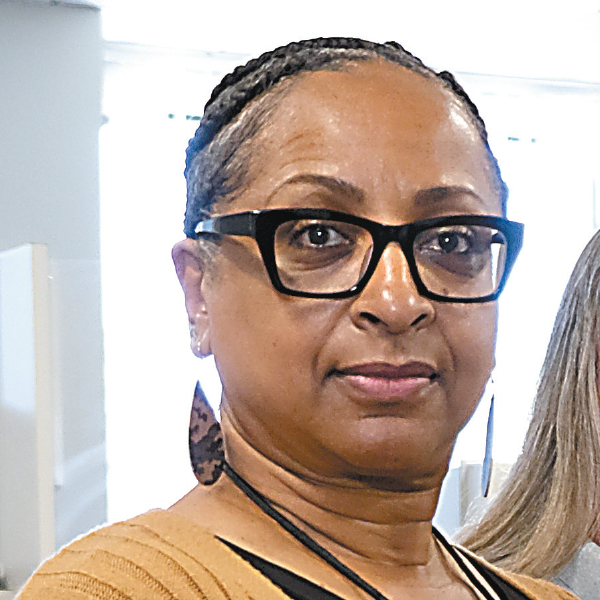
Karen Baggio: Sure. I began my City service in 1998 with Public Works/Sanitation in its City Wide Days group, maintaining and conducting inspections of large City sewer systems. From there I took a couple of lateral positions. Once I found out about the Assistant Inspector program, I took the civil service exam for Assistant Inspector and in 2005 I joined the LAHD’s Assistant Inspector program. I came up through the ranks of LAHD’s Assistant Inspector training program, after which I was promoted to Housing Investigator. I was a Housing Investigator for six years and then received another promotion to Sr. Housing Investigator. I held that position for six years, and in 2022 I was promoted and became our department’s first female Principal Inspector.
Were you doing anything related to housing inspections before you joined the City?
Karen: Before I joined the City I had some experience with property maintenance and property management. But the bulk of my knowledge and experience came from the training I received via the Assistant Inspector program.
Kristine, same question.
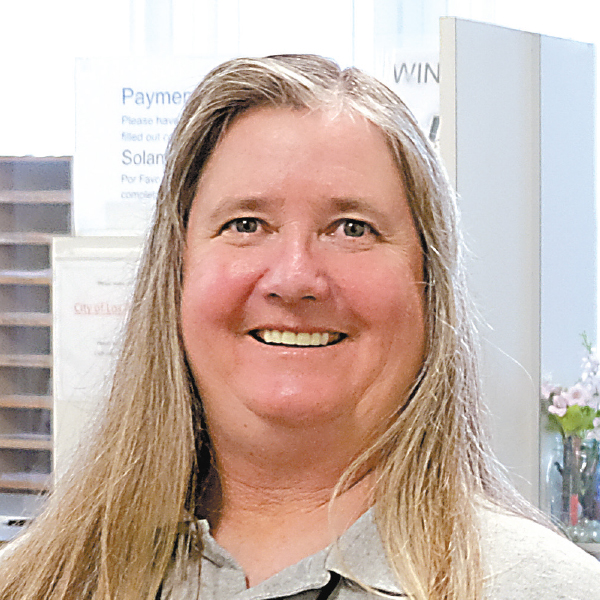
Kristine Ritzke: I started with Building and Safety as an Assistant Inspector, and I was there for two years. I then became an Assistant Inspector with the LAHD. I was an Assistant Inspector III for about two years, and then I was promoted to a Housing Investigator for four or five years, and then to a Sr. Housing Investigator.
Before I joined the City, I worked with the City of Anaheim in code enforcement. I was part-time there, and I worked both jobs to figure out which city I wanted to work for. One was part-time and it was a graveyard shift, from 1 a.m. to 5 a.m., and then in LA our start time was 7 a.m., so I did both for a while.
 Inspections
Inspections
Explain to the non-housing experts the inspection function in general terms – what it does, what the inspectors are tasked to do, why they’re necessary, and how it developed.
Karen: LAHD’s two main inspection processes are SCEP, the Systematic Code Enforcement Program, and complaint-driven inspections. In SCEP, we conduct inspections for all residential properties with two or more units on site, where at least one of those units is a rental unit. We do a thorough inspection of all the properties, checking the plumbing, electrical, weather protection, and maintenance of the property to ensure safe and habitable conditions and to verify compliance with standards outlined in the applicable building and housing codes. The SCEP cycle has a target of inspecting every rental unit every four years. In addition to that, if there are complaints to report or issues within that four years, individuals can call in and file a complaint. Once we receive and schedule the inspection, the Complaint Inspector will make a site visit to determine if code violations exist. If they are found to exist, the Complaint Inspector will then cite those violations and issue a notice to comply.
The SCEP inspector looks at the entire property, whereas the Complaint Inspector focuses on the specific complaint. However, if the Complaint Inspector sees significant deferred maintenance at the property, they can request the case be converted to a SCEP inspection.
For a SCEP inspection, what conditions are you looking for?
Karen: Fire, life-safety issues, smoke detectors, carbon monoxide detectors, exit pathways, egress doors and windows. We’re also looking for maintenance issues, and that there is a habitable living environment. We’re looking to make sure that this is a safe environment for people to live in.
Are you looking at structural issues, too? Is seismic retrofitting part of it?
Karen: Yes, we do cite any structural violations seen during an inspection.
Kristine: For seismic review, that period has already come and gone. Anybody who has not done their seismic retrofit at this point would be in violation. And, the enforcing authority on that is Building and Safety.
The new review coming up is balconies. This is also known as Elevated Exterior Elements, a relatively new state law requiring these elevated elements to be inspected for signs of decay and or structural deficiencies that could develop over time related to wood framing.
Got it. How long have there been housing inspectors in the City of L.A.?
Karen: In 1997, the Blue Ribbon Citizens Committee on Slum Housing released a report documenting the deterioration of housing conditions in Los Angeles, and determined that the City needed to make drastic changes to its enforcement process.
This Committee found that the City of Los Angeles needed to take a more proactive stance in dealing with rental housing stock and the enforcement of applicable Health and Safety laws. In 1998 the SCEP, Systematic Code Enforcement Program, was enacted and the LAHD began hiring Housing Investigators and conducting these systematic code enforcement inspections.
What was the growth of the program in 1998?
Karen: Before 1998 the system in place was largely reactive. Because of some growing deteriorating conditions that existed at the time, we needed a more proactive system. That’s when the Systematic Code Enforcement Program came into effect, to do the work proactively on a routine basis.
The LAHD existed before 1998, but they weren’t responsible for conducting these types of inspections. Building and Safety was responsible for every building in the City of Los Angeles, including residential properties. After the Blue Ribbon committee’s report was released, the Los Angeles Housing Dept. developed and championed the creation of a Systematic Code Enforcement Program that moved the jurisdiction of code enforcement of multi-family housing away from LADBS and to LAHD. LAHD was then tasked with the responsibility for inspections of multi-family residential units.
Kristine: I believe at Building and Safety it was referred to as the Conservation Bureau. The Conservation Bureau was a big thing historically on the west side, in the Venice area, because Venice had been annexed to the City of Los Angeles and there were all of these apartment buildings there; the City wanted to inspect them.
That’s interesting. Let’s now talk about the complaint-based inspections.
Kristine: Sure. Anybody can file a complaint with the City of Los Angeles, and as long as it’s under the jurisdiction of the LAHD, which would be any multi-family residential rental unit, we accept that complaint. At Complaint Intake, the Complaint clerical staff reviews the complaints and schedules the Regional Inspector for that area. The Inspector goes out, verifies whether or not the alleged violations exist. If they exist then a notice to comply is issued.
How do the complaints come in?
Kristine: Renters or landlords can call 3-1-1 or the LAHD Hotline directly at (866) 557-7368. We also have a hotline that accepts code enforcement complaints. They can also file a complaint on our public website, or they can actually walk in and file a complaint at the public counter.
How does the Notice to Comply process work? Do you transfer that to a different division within Housing?
Karen: If violations are cited, a Notice to Comply will be issued and a 30-day compliance period is given. Once the compliance date on the notice has passed, we come back for a re-inspection to see if the property owner has made the required corrections and complied with the notice. If they have complied, the case is closed. If property ownership has not complied, meaning they have not corrected the violations, then the property owner may be subject to further enforcement via a General Manager’s Administrative Hearing with possible escalation to the City Attorney’s Office and the Rent Escrow Account Program or REAP. There is the possibility of an extension of time only after the first re-inspection and if staff determines that significant progress has been made.
So you get involved with the City Attorney’s Office if it goes that far?
Karen: Inspection staff sometimes may be called to testify or to give a deposition. We do have a court liaison unit that works with the City Attorney’s Office.
Do you hope it doesn’t get that far?
Karen: We, of course, always hope for compliance. And historically we have achieved, I believe, nearly 99 percent compliance, with only about one percent going to the City Attorney’s office.
Kristine: The ultimate goal of the LAHD, whenever we do issue an order, is compliance. Get it fixed, make it safe, get the work done; it’s a benefit for the property owner as well as the actual tenants. We work tirelessly to make it happen.
Keeping the buildings updated adds to the wealth and the value and the stock of the City of Los Angeles. It’s good for the entire City.
Kristine: Absolutely, and particularly in the Southern regional office area, where the majority of our housing stock is duplexes. Most of those duplexes are in excess of a hundred years old. So we support maintaining these buildings versus knocking them down and building something new.
How many inspectors do you have?
Kristine: In our complaint staff group, I believe 99 percent of our inspectors work what we call a 9/80 schedule. We do have some who work a 5/40. A 9/80 means we work five days one week and four days the next week, in a two-week time frame. We have approximately 15 Inspectors assigned to Complaints, and they respond to approximately 25 inspections per week.
Karen: Currently there are 55 inspectors assigned to the SCEP program. On average, SCEP Inspectors inspect approximately 100 rental units per week.

 International Codes
International Codes
You don’t create the code, you just enforce it, correct?
Karen: LAHD doesn’t create the various codes we enforce, but as a Principal Inspector it is my job to correctly interpret that code during difficult situations. We are the enforcement arm for the multi-family properties in Los Angeles.
Do you get a chance to give them feedback on code?
Karen: I have not done so personally.
Kristine: No I have not, either.
Who creates the code?
Kristine: In the City of Los Angeles, Building and Safety creates and maintains the Building Codes based on Codes adopted by the State of California, with local amendments due to Los Angeles’s ever-changing conditions.
 Issues and Education
Issues and Education
What are the big issues inspectors see? Plumbing, vermin, electricity, a mix? What are you seeing a lot of?
Karen: We have a lot of older stock, so most violations are for maintenance and repair issues. Especially lately due to the inclement weather or the age of the property, a lot of the paint and weatherproofing is happening as well. And then of course wear and tear on the property. Also – tenants sometimes take down the smoke detectors because they were cooking, or whatever reason. We see that a lot, but it comes with the job.
Kris, what kinds of complaints are you seeing?
Kristine: The majority of the complaints that we get in the cold weather season are malfunctioning heaters. And because of the rain, we’re getting a lot of weather protection issues with leaky roofs, and water intrusion into units. It can include floor coverings, carpet that’s ripped, holes in walls, peeling paint.
Is education a big part of what you do?
Kristine: Absolutely. When we go out to a property and you’re pointing out a leaky faucet or a toilet that’s running, we tell the landlord, do you realize how much money that’s costing you in your water bill? When you’re educating property owners on these issues, they are more inclined to go ahead and get the repairs done in a very timely manner.
Karen: I’m always encouraging our inspection staff to explain exactly what violations they’re citing, and how it would benefit the owners to maintain their properties. Also, if a property owner fails to comply within 45 days of the compliance date, they are required to attend PMTP, Property Management Training Program, where they get additional information.
Are you seeing a lot of livability conditions worsening now because of the housing crunch, and not enough housing for the people who want it? Are you seeing a lot more livability issues now than you saw perhaps 10 years ago?
Karen: I think those are two different things because the housing crunch has caused a different situation. What we saw before – around 2005, maybe up to 2008 – was way worse as far as livability conditions, when we saw so much illegal construction or unapproved use, or people living in sheds or garages, things like that. There was a lot of that kind of thing going on. We still have people living in converted garages, but not as much or in the same conditions. With ADUs now, people can build those and convert them more easily, so that’s helping out a lot. We still get that occasionally, but I think the livability conditions have improved since then. Now, with the housing crunch, what we’re seeing is more people in those units. We are dealing with a different issue where the occupancy levels are taxing the plumbing and the maintenance more. The livable conditions have improved but the use of them and shared living is more of an issue now.
Kristine: One of the biggest problems with trying to legalize Unapproved Dwelling Units is the size of the lot and the parking. The UDUs and the Accessory Dwelling Units allow you to go ahead and not have to have all those other items to get that housing stock added into the inventory.
As for occupancy, four people in a one-bedroom apartment is not unusual at this point.
 Challenges
Challenges
What are the unique challenges of what inspectors do? As in is your safety ever at risk?
Kristine: One of our big things on the complaint side is no different than the postman – there are dogs running around, so dog bites. Another big safety issue we deal with is driving to the locations. We’re driving all over the place, especially in complaints. The South Region is a large area – from one end to the other is 30 miles and from the east to west can be 20 miles. It is not unusual for an Inspector to drive anywhere from two to three hundred miles in two weeks. Inspectors use their personal vehicles. We are mileage employees, so of course we’re reimbursed by the City for all the miles that we drive on City time.
Karen: As Kris said, there’s always some risk being out in the field. I’ve heard of Inspectors driving down the street or pulling up to an inspection, and having items thrown at their vehicles. We’re always concerned with risks and remind staff to be concerned with their safety and mindful of their surroundings while walking down the street, and during inspections. We recommend they remain vigilant even when deciding where to park their vehicles and always have a route out.
Also, Inspectors have to be a problem solver and a mediator. Meditation skills are key, especially in complaint inspections. We have an older housing stock, so we don’t know what was there historically; we need to rely on experience and research to make determinations. For example: Why is the unit count off? This is supposed to be an eight-unit building, but now it’s a 10-unit building. Is this a false wall? We have to be able to recognize through knowledge and experience, that there is an anomaly to determine what it is we need research on. The owners now welcome us more, as opposed to when we first started – you would run across some owners who were offended that we were telling them what to do with their property. Now they know we’re coming and they know, I hope, that they’ll benefit in the long run, and it works out better for everyone.
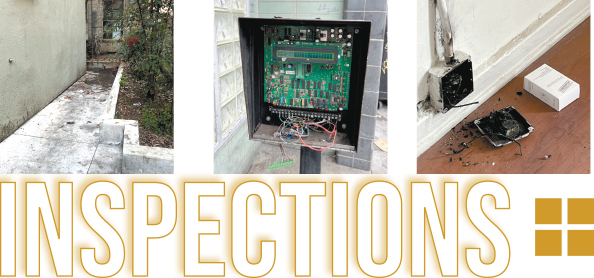
 Stories of the Crunch
Stories of the Crunch
Tell us some stories about situations you saw that broke your heart, either positive or maybe tough situations.
Kristine: About two years ago, it was a complaint inspection and I was the Supervisor. My Inspector was scheduled to go out for that complaint inspection. He arrived on site and knocked on the door. There was no answer at the door, so he called the complainant. No one answered, but when he was standing on the stoop, he heard a faint cry. It sounded like a female calling for help. So he called me. I got hold of LAPD, and we coordinated. LAPD arrived on site. They heard a faint cry for help as well, so they broke down the door. An elderly female was on the floor and had been there for two days like that. The Fire Dept. took her to the hospital. Together we saved this woman’s life. When we arrive, we make every effort to try and contact the complainant. But if we can’t contact them then the complaint is closed because we’re not observing any violation. But in this case my Inspector took that extra step to say I think I hear something, let me call my Supervisor. We followed up on it and she survived.
Karen: I haven’t had anything that dramatic, but the one thing I recall is that stories of older people always get to me. Years ago I was inspecting an unreinforced masonry building, an old brick building. When I walked in, there was a long hallway with the stairs going up. The owner or the manager suggested we skip the first unit because it had a bad smell, and that the older woman didn’t take care of the unit. He didn’t want to go in at all, but suggested we could go in last because the odor would then fill the hallway, and we might not be able to continue. So I agreed and we held it for the last stop.
When we got to it, this little old lady was sitting in her recliner, alone, and the place was terrible, just horrendous. The carpet was matted and covered. I think she had a bird, and there were bird droppings all over the carpet. Her own feces were also on the floor back near the bathroom, and the smell was terrible. I didn’t want to make a face; I wanted to go in and do my inspection and let her keep her dignity. I talked to her the whole time that I was in there. How are you doing; is there anything in particular in the unit you want me to look at; what’s going on? She said she was fine, keeping quiet even though the world around her was terrible. Eventually, I asked her if she wanted someone to help her take care of things. She said yes, so I made some referrals, especially with the Dept. on Aging. She was given help to get things cleaned up. We’re advocates for them beyond just the regular inspection; there’s a human portion to it. That always gets to me.
Helping fix a broken window in a kid’s bedroom or turning on the hot water in the morning – these situations are out there. We’re in the cold season right now, and people need their heaters. A lot of heaters are not functioning. I recently received a call from a woman in her 70s; the boiler system wasn’t working, and she was freezing. What can I do for her? We wrote what’s called a two-day order, an urgent repair that had to be done to get the boiler system back up. Afterward, she called back to thank everyone involved in the process. I take pride in my work, and I’m glad I’m able to make a difference for people.
What do you wish people knew about City Inspectors?
Kristine: We’re doing a job and we’re there to help them. That’s the key.
Karen: I hope tenants know we are there to help and that property owners know we’re not there to make their life difficult, or make issues for their property. Our primary purpose is to make sure that we are providing livable healthy safe environments for all concerned.
 The Reward
The Reward
What do you love about what you do?
Kristine: The reward of helping people. The first time somebody said thank you, I was parked at a red light, and I thought, wait a minute. Am I getting carjacked here, or what’s happening? It was a young gentleman and he said, “Thank you, you helped my grandma. She is so happy.” I was like, oh my God, that’s great, to be recognized. Karen, you’ve been with the department longer than me. How many thousands of inspections have we done? I got a phone call once, and they asked, “Do you remember me?” My first thought was, how did you get my phone number? “You were so helpful, so I figured I’d call,” they said. The reward of helping people is powerful.
Karen: I get the same phone calls. They call to say you were so helpful to them back then. The satisfaction of helping folks is strong. I remember one little boy who was so thankful that I got him a heater in his unit. To know at the end of the day that you’ve helped so many people, I appreciate that. A job that goes beyond earning a living but also allows you to make a difference, I love that. I love this job.
Kristine: My job is fun. Where else can you get paid to do all of this, and help people?
Karen and Kristine, thank you both very much for contributing your time to explain what you do and to tell your stories.
Karen: Thank you for shedding light on the LAHD. I appreciate that.
Kristine: Thank you! Bye-bye.
|
BEHIND THE SCENES
|


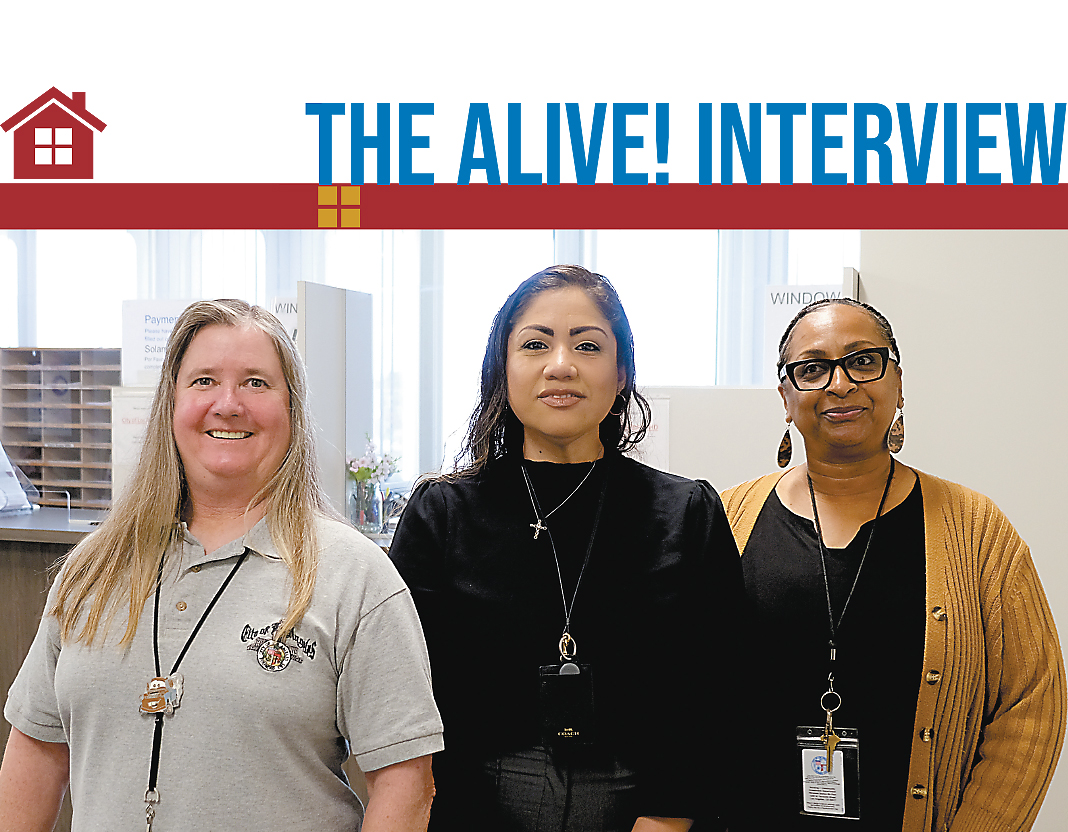
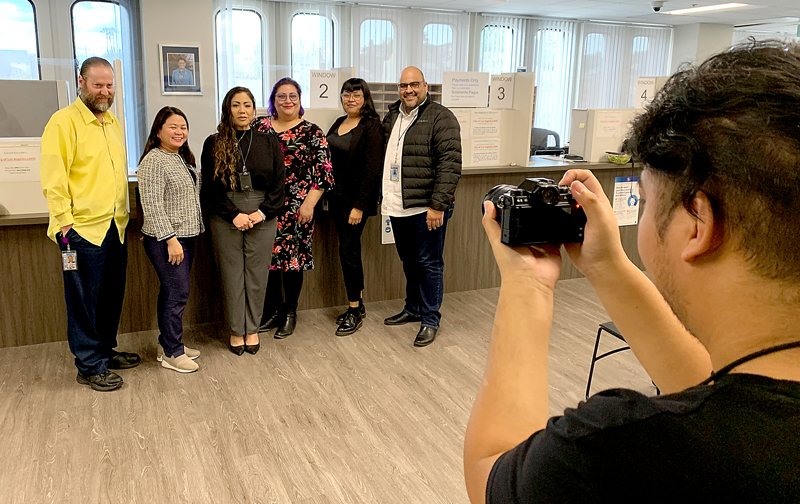 Housing Graphic Designer Petro Barrera photographs staffers at the public counter in Echo Park.
Housing Graphic Designer Petro Barrera photographs staffers at the public counter in Echo Park.










